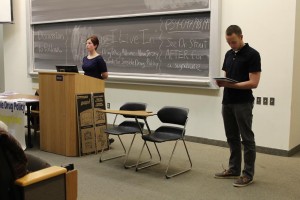By Jessa Gianotti
Correspondent
When most Americans think of the War on Drugs, turbulent countries like Mexico, Colombia and various South American states come to mind. However, most Americans overlook the ongoing War on Drugs right here in the United States.

Over 2.3 million Americans are currently incarcerated in the United States. Of those incarcerated, over 500,000 people are in jail for nonviolent drug crimes — a daunting social issue, according to the documentary “The House I Live In.”
On Wednesday, March 5, the Drug Policy Alliance (DPA) and NJ Students for Sensible Drug Policy (SSDP) hosted a screening of the 2012 Sundance Film Festival-winning documentary written and directed by Eugene Jarecki.
The documentary displays the perspectives of many people involved in the ongoing drug war, including family members of those affected by the drug war, drug dealers, addicts, inmates, policy makers, physicians and law enforcement agents.
“The House I Live In” offers a glimpse into the drug problems spanning the United States, including New York, Iowa, Oklahoma, Vermont, Florida and Rhode Island. More importantly, it shows the vicious cycle associated with the drug war and reveals problems within the American prison system.
“What drugs haven’t destroyed, the war against them has,” said David Simon, creator of the acclaimed HBO series “The Wire” and commentator in “The House I Live In.”
The documentary exposes that certain races, specifically African Americans, along with those of the lower socioeconomic bracket, are marginalized and forced into environments where drug use and dealing has become a normalized counterculture.
In the United States, there are mandatory minimum sentences for drug crimes, and even in the most heartbreaking or unfortunate circumstances, these charges cannot be lessened, as explained in the documentary by federal judge Hon. Mark Bennett.
The vicious cycle continues when these inmates are released from jail and cannot matriculate back into society without difficulty. Convicted felons have trouble finding jobs and receiving government aid for educational tuition and public housing.
“America’s public enemy number one in the United States is drug abuse,” said Richard Nixon on June 17, 1971, in a clip shown in the documentary. “In order to fight and defeat this enemy, it is necessary to wage a new all-out offensive.”
The problem with the theory behind this “offensive” against the drug war is that more incarcerations are not necessarily the solution. More preventative measures need to be taken to help those entangled in this mess of a war, which is the goal of SSDP and DPA.
A chapter of SSDP is currently forming at the College. Jason Klosek, a junior psychology major, is chartering the organization on campus to advocate for legislative fairness for drug punishment.
After the showing of the documentary, Amanda Bent, a policy associate from the New Jersey office of the DPA, spoke about the ongoing drug problem with Klosek.
“We are neither condemning nor condoning drug use. We are finding sensible solutions,” Bent said.
The Drug Policy Alliance acts to implement alternatives and preventative measures for the war on drugs, including Good Samaritan policies, proper drug education, safe needle exchanges and the Higher Education Act. Organizations such as the DPA and SSDP are advocating for these marginalized people and working to restore fairness in the American legal system regarding drug charges.






